|
|
|
Sort Order |
|
|
|
Items / Page
|
|
|
|
|
|
|
| Srl | Item |
| 1 |
ID:
087813
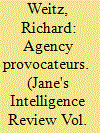

|
|
|
| 2 |
ID:
098456
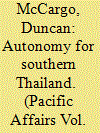

|
|
|
|
|
| Publication |
2010.
|
| Summary/Abstract |
Over 4000 people have died since 2004 in a violent conflict affecting Thailand's Malay-majority southern border provinces, Pattani, Yala, Narathiwat, and four districts of neighbouring Songkhla. Offering some form of autonomy or substantive decentralization to this troubled region might seem like an obvious response to the violence, but the topic has remained largely taboo until recently. Autonomy is seen by Bangkok in essentially pre-Cold War terms, as the thin end of the wedge, which could prefigure an unravelling of the unitary state crafted during the time of King Chulalongkorn. Nevertheless, in recent years a number of senior figures from different positions in Thai society have voiced support for alternative governance arrangements for the deep South. These have included Dr Prawase Wasi, one of the architects of the 1997 constitution, former prime minister Chavalit Yongchaiyudh, former interior minister Chalerm Yubamrung, and a number of academics. Their proposals range from full autonomy for the deep South to a national project of regionalization, as well as the creation of a new ministry to oversee the area. Prime Minister Abhisit Vejjajiva has offered mixed messages on the subject but has indicated sympathy for some form of decentralization. This article argues that despite the controversial nature of such proposals, there is a slowly emerging consensus around the need for a political solution to the conflict. In other words, Thailand is moving towards a post-Cold War understanding of autonomy as a means of preserving rather than undermining the nation state.
|
|
|
|
|
|
|
|
|
|
|
|
|
|
|
|
| 3 |
ID:
095396


|
|
|
|
|
| Publication |
2010.
|
| Summary/Abstract |
At the beginning of the 1990s, Italy went through two tectonic changes. Externally, the end of the Cold War called for a redefinition of the roles of NATO and the EU, the pillars on which Italy had built its foreign and security policy for forty years. Internally, Italy's old ruling elites vanished under the huge mani pulite corruption scandal. The new political parties that rose in their place have remained committed to NATO and the EU, but have often met with obstacles in reconciling the national, European and Atlantic components of Italy's security. While this hinges mostly on structural factors - like the rising costs of participation in NATO or EU operations abroad, including in terms of public support - the tendency of the new elites to emphasize their differences and neglect their more fundamental commonalities have multiplied the "grey zones" in Italian security policy.
|
|
|
|
|
|
|
|
|
|
|
|
|
|
|
|
| 4 |
ID:
111705
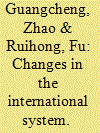

|
|
|
| 5 |
ID:
085122
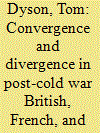

|
|
|
|
|
| Publication |
2008.
|
| Summary/Abstract |
Post-Cold War military reforms in Britain, France, and Germany have been characterized by patterns of convergence in the objectives, instruments, and institutional forums of defense policy but by divergence in temporality. These patterns of convergence and divergence cannot be fully explained by cultural approaches. Neither can they be explained solely by a focus on the role of international structure, as neo-realism posits, although the post-Cold War distribution of capabilities is driving Britain, France, and Germany toward policy convergence. Instead, the analysis builds upon the insights of neoclassical realism. Culture emerges not so much as a cause of action as instrumental and a resource for policy leaders in the domestic political and temporal management of reform.
|
|
|
|
|
|
|
|
|
|
|
|
|
|
|
|
| 6 |
ID:
122831
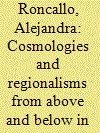

|
|
|
|
|
| Publication |
2013.
|
| Summary/Abstract |
Drawing on a Polanyian analysis of the land question, this article aims to analyse both Western and Indigenous cosmologies of Abya Yala-the name that indigenous peoples give to the American continent-to understand the relationship between human beings and land and nature. These cosmologies are at the heart of the way in which two distinct societies construct their regional space, one from 'above', the other from 'below', and they are therefore key to understanding today's climate change problématique. Following this nexus it is argued that, since the end of the Cold War, a new regional 'double-movement', unleashed by the quest for land and natural resources has been in the making. This is a superstructural or legal battle between Western transnational regime-making and a law that originated at the 'centre of the Earth'. The article explains both regionalisms and the dialectical interaction between them and demonstrates that Karl Polanyi's legacy remains relevant for the 21st century.
|
|
|
|
|
|
|
|
|
|
|
|
|
|
|
|
| 7 |
ID:
117691
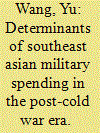

|
|
|
|
|
| Publication |
2013.
|
| Summary/Abstract |
This study examines the demand of military expenditure among Southeast Asian countries since the end of the Cold War. By using a dynamic panel approach, I find that military spending in the region has been jointly determined by economic, strategic and socio-political factors. In particular, surging foreign debt burdens and the rise of China - two regional issues that gained prominence in the post-Cold War period - show their significance as determinants along with other generalist variables. The results therefore ask for the development of even-handed and region-sensitive approaches to studying military build-up in the region of Southeast Asia.
|
|
|
|
|
|
|
|
|
|
|
|
|
|
|
|
| 8 |
ID:
047115
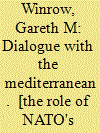

|
|
|
|
|
| Publication |
New York, Garland Publishing, 2000.
|
| Description |
xix, 261p.
|
| Standard Number |
0815336241
|
|
|
|
|
|
|
|
|
|
|
|
Copies: C:1/I:0,R:0,Q:0
Circulation
| Accession# | Call# | Current Location | Status | Policy | Location |
| 044334 | 327.1822/WIN 044334 | Main | On Shelf | General | |
|
|
|
|
| 9 |
ID:
092347
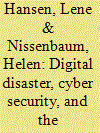

|
|
|
|
|
| Publication |
2009.
|
| Summary/Abstract |
This article is devoted to an analysis of cyber security, a concept that arrived on the post-Cold War agenda in response to a mixture of technological innovations and changing geopolitical conditions. Adopting the framework of securitization theory, the article theorizes cyber security as a distinct sector with a particular constellation of threats and referent objects. It is held that "network security" and "individual security" are significant referent objects, but that their political importance arises from connections to the collective referent objects of "the state,""society,""the nation," and "the economy." These referent objects are articulated as threatened through three distinct forms of securitizations: hypersecuritization, everyday security practices, and technifications. The applicability of the theoretical framework is then shown through a case-study of what has been labeled the first war in cyber space against Estonian public and commercial institutions in 2007.
|
|
|
|
|
|
|
|
|
|
|
|
|
|
|
|
| 10 |
ID:
095033


|
|
|
| 11 |
ID:
141024
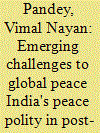

|
|
|
| 12 |
ID:
119243
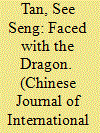

|
|
|
|
|
| Publication |
2012.
|
| Summary/Abstract |
How Asian countries relate strategically with rising China remains one of the most debated questions in Asian security today. Although the concomitant rise of regional powers (China, Japan, and India) has undoubtedly shaped, and continues to shape, the geopolitical milieu of post-Cold War Asia, it is the perceived emergence of China as an economic and military power that has nonetheless engendered most concern among Asian countries, not least Singapore. Analysts, however, disagree over how Asians perceive and respond to China's rise. One view, for example, has it that Asian countries have opted to bandwagon with China (as vassal states once did with imperial China);1 another that Asian states on the whole have demonstrated a greater inclination towards balancing China.2 A third view adopts the via media in suggesting that aspects of both bandwagoning and balancing can in fact be discerned in the behaviour of Asian states.3 Smaller and/or weaker Asian countries accordingly 'hedge'4 against China and other major powers as they manage their respective vulnerabilities and dependencies vis-à-vis those more powerful than they.5
|
|
|
|
|
|
|
|
|
|
|
|
|
|
|
|
| 13 |
ID:
113293
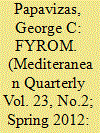

|
|
|
|
|
| Publication |
2012.
|
| Summary/Abstract |
In the post-Cold War reality, stability in the Balkans must be of great importance. It is therefore imperative to examine the nature of the region's instabilities as well as their sources and their implications. The Former Yugoslav Republic of Macedonia (FYROM) has been praised by the West as a good example of stability. However, because of several systemic weaknesses-past habits acquired during fifty years of communism-FYROM has become and will always be a destabilizing force, especially if it continues to pursue the expropriation of the Hellenic Macedonian name and ethnicity, the intensification of its illiberal history revisionism, the expropriation of the Bulgarian language and parts of Bulgarian history, and the mistreatment of minorities.
|
|
|
|
|
|
|
|
|
|
|
|
|
|
|
|
| 14 |
ID:
093875


|
|
|
|
|
| Publication |
2010.
|
| Summary/Abstract |
The overall post-Soviet and post-Cold War transformation of the five Central Asian countries is multifaceted and complicated. New geopolitics has penetrated into almost all critically important spheres of post-Soviet transformation. Geopolitics even influences spheres such as national self-identification, which is traditionally regarded as having nothing to do with geopolitics. That is why one can assume that geopolitics stipulates regional integration as well. More precisely, regional integration for Central Asia is its response to geopolitical pressure from outside the region and its way of creating its new geopolitical status from within.
|
|
|
|
|
|
|
|
|
|
|
|
|
|
|
|
| 15 |
ID:
091876


|
|
|
|
|
| Publication |
2009.
|
| Summary/Abstract |
A critical debate on nuclear weapons is once again in the limelight. President Barack Obama has unequivocally, ambitiously, and repeatedly stated his ultimate vision of a world without nuclear weapons. Under the Obama policy, zero nuclear weapons is, for the first time in U.S. history, an operational, tangible U.S. policy goal and thus a measuring stick against which to judge a host of shorter-range, less ambitious initiatives or actions.
|
|
|
|
|
|
|
|
|
|
|
|
|
|
|
|
| 16 |
ID:
091913
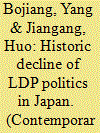

|
|
|
|
|
| Publication |
2009.
|
| Summary/Abstract |
Japan's ruling Liberal Democratic Party (LDP) suffered a crushing defeat in the August 30th general election to the House of Representatives.This was due to a change in election rules, the decline of LDP's traditional bases of support, and the long-standing internal problems.If the LDP now fails to respond to these changed realities, it will further lose credibility with the Japanese people.
|
|
|
|
|
|
|
|
|
|
|
|
|
|
|
|
| 17 |
ID:
115368
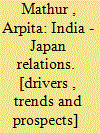

|
|
|
|
|
| Publication |
Singapore, S.Rajaratnam School of International Studies, 2012.
|
| Description |
130p.
|
| Series |
RSIS Monograph No.23
|
| Standard Number |
9789810728038
|
|
|
|
|
|
|
|
|
|
|
|
Copies: C:1/I:1,R:0,Q:0
Circulation
| Accession# | Call# | Current Location | Status | Policy | Location | IssuedTo | DueOn |
| 056817 | 327.54052/MAT 056817 | Main | Issued | General | | A118 | 18-May-2024 |
|
|
|
|
| 18 |
ID:
110205
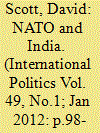

|
|
|
|
|
| Publication |
2012.
|
| Summary/Abstract |
In this article, I argue that after having experienced a distinctly cool relationship throughout most of the post-war period and for the 10 years following the end of the Cold War, India and North Atlantic Organization (NATO) are now gradually moving towards each other. Indeed, during the past decade, NATO's 'out-of-area' operations have taken it eastwards from the Mediterranean, while India's 'extended neighbourhood' framework has brought it westwards from the Indian subcontinent. This has created a geopolitical overlap between these two actors, most notably in Afghanistan but also elsewhere in the Indian Ocean. Common advocacy of liberal democracy and overt concerns over jihadist destabilization have brought these two actors together. In NATO's post-Cold War search for relevance and India's post-Soviet search for partners, they have found each other. Unstated potential concerns over China are also a feature in this strategic convergence. However, while NATO has adopted a flexible range of 'Partnership' frameworks, India's sensitivity on retaining 'strategic autonomy' will limit their cooperation to informal ad hoc arrangements.
|
|
|
|
|
|
|
|
|
|
|
|
|
|
|
|
| 19 |
ID:
046671


|
|
|
|
|
| Publication |
DelhI, Konark Publishers Pvt Ltd., 1994.
|
| Description |
x, 245p.
|
|
|
|
|
|
|
|
|
|
|
|
Copies: C:1/I:0,R:0,Q:0
Circulation
| Accession# | Call# | Current Location | Status | Policy | Location |
| 045855 | 327.17/RAJ 045855 | Main | On Shelf | General | |
|
|
|
|
| 20 |
ID:
088574


|
|
|
|
|
| Publication |
2009.
|
| Summary/Abstract |
In the winter 1978 issue of International Security, Raymond L. Garthoff authored a seminal article outlining common fallacies in United States government estimates of enemy intentions during the Cold War. Now, given the significant changes in threat over the past 30 years, it seems appropriate to take a fresh look at fallacies - evaluating old ones and introducing new ones - in enemy intentions estimates pertaining to post-Cold War (and post-9/11) security dangers. Based on its assessment, this article concludes that the challenges to accurate intelligence assessment of enemy intentions, and the need to move away from dysfunctional standard operating procedures, have never been higher.
|
|
|
|
|
|
|
|
|
|
|
|
|
|
|
|
|
|
|
|
|